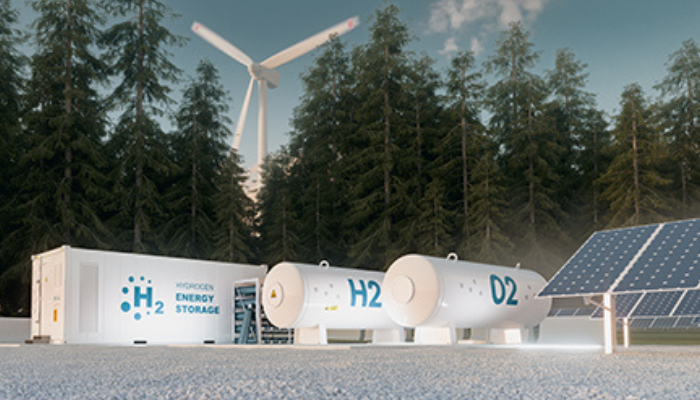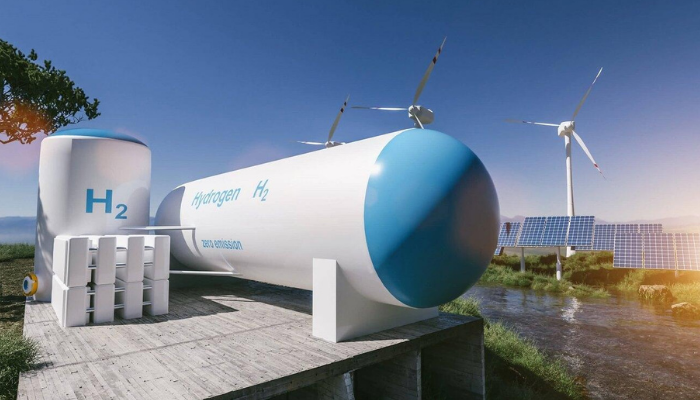The Future of Hydrogen Fuel in India

Table of Contents
The depleting fossil fuel resources and increasing population in India raise concerns about energy demand and security for the future. Amidst all these worries, one ray of hope is using Hydrogen fuel in India. Hydrogen is one fuel attracting increasing attention as a clean and renewable energy source.
Although its future is promising in India, using it on a large scale requires a lot of research and development. The Indian government has been focusing and investing heavily in this clean energy source, and there are many companies working on making this a reality. In this article, we’ll explore the current hydrogen projects in India and also the potential future prospects.
But before we move on to explore the future of hydrogen fuel in India, let’s get the fundamentals out of the way!
What is Hydrogen?
Hydrogen is considered the lightest and most abundant element in the universe. Renewable resources like water and wind can help to produce hydrogen. It can generate power without producing harmful emissions when used as a fuel.
Why Hydrogen?
You might be wondering if we have several renewable energy sources like solar and wind, why do we need hydrogen? The answer is that hydrogen has the potential to be an efficient and clean source of energy.
Solar and wind energy are great, but both have one big drawback – they are intermittent. This means that they only produce power when the sun is shining or the wind is blowing. But what about at night or on calm days? This is where hydrogen comes in.
To put it simply, the limitations of solar and wind energy can be overcome by using hydrogen fuel. Moreover, hydrogen can be potentially used to store energy and can also be useful in generating power on demand, even when the sun is not shining, or the wind is not blowing. This means that it is a very versatile and reliable energy source.
Another advantage of hydrogen fuel is that, unlike solar or wind energy that you cannot store, hydrogen can be stored but with intensive care. This is a significant factor as hydrogen fuel in India can be a brilliant fuel to power cars, trucks, and buses and generate electricity.
Future Prospects of Hydrogen Fuel in India
To understand the future prospects of hydrogen fuel in India, we need to understand how the country connects to this energy source. Here are some instances that show how India is slowly but surely moving toward a hydrogen-based economy:
The International Thermonuclear Experimental Reactor (ITER)
ITER is an international project aiming to create a miniature sun on earth, and the project is named “The Way”. This is among the first steps toward harvesting energy from hydrogen. ITER will be the world’s largest Tokamak (magnetic confinement device used to confine plasma in order to sustain a fusion reaction) and is being built in Cadarache, France. Furthermore, the development collaborates with the seven-member parties to demonstrate fusion power’s scientific and technical feasibility.
India is one of the contributors, alongside the European Union, Russia, Japan, China, the United States, and South Korea. As a part of the ITER project, India is making in-kind and in-cash contributions. The cash contribution is about 10% of the total costs, about Rs 20,000 crore or about $2.2 billion. Whereas the in-kind includes a Cryostat, this giant vacuum vessel is the largest component of the reactor. Other contributions include in-wall shielding, multiple heating systems, power supplies, and diagnostics. In return, India receives a share of the tritium produced in ITER, which will be extremely useful to fuel future fusion reactors in India.
Hydrogen to Power Space Robots
Now, this is an interesting implication of using hydrogen. Currently, most satellites and space robots source power from solar panels. However, solar panels have some limitations. But the use of hydrogen is not uncommon. If you need a reference, the Apollo 11 mission used hydrogen as its fuel.
The main advantage of using hydrogen is that it can store a lot of energy in a very small volume. This is very important for space robots as they need to be light. Moreover, hydrogen is very efficient and can generate a lot of power.
Talking about ISRO, it is currently using solar panels to power its satellites. However, with the advances in hydrogen fuel cells, ISRO is looking at using them to power its future satellites. This will give ISRO the much-needed independence from the sun. Also, it will allow the organisation to send heavier payloads to space as fuel cells are much lighter than solar panels. This will give a boost to the use of hydrogen fuel in India and its space projects.
Hydrogen Fuel Cells

Another way that India is looking at exploiting hydrogen is through fuel cells. Fuel cells are brilliant devices that convert chemical energy into electricity. They combine hydrogen with oxygen in the presence of a catalyst to create a current. The only by-product of the process is water and heat.
Fuel cells are very efficient and can potentially replace internal combustion engines in all sorts of automobiles. Numerous nations, like France, Spain, Canada, Russia, Norway, etc., actively use these hydrogen fuel cells.
Several big companies like BMW, Daimler, and Honda have already started using fuel cells in their vehicles. In India, the market for fuel cells is still in a nascent stage. There are no indigenous manufacturers of fuel cells as of now, but it’s quickly changing.
Several companies have started investing in this space. You can expect automobile companies like TATA Motors and Mahindra to start using fuel cells in their vehicles soon. These companies are already venturing with electric vehicles, so it’s a logical step for them to explore fuel cells.
Hydrogen in Domestic Use
One of the main areas where hydrogen can be used is in domestic cooking stoves. Most households in India use LPG (liquefied petroleum gas) as cooking fuel which is very polluting and emits harmful greenhouse gases like carbon dioxide and methane.
Hydrogen, on the other hand, is a very clean fuel and doesn’t produce any harmful emissions. Moreover, hydrogen is very efficient and can generate a lot of heat. There are several other reasons why it can be a better fuel for domestic use.
However, India’s main challenge with using hydrogen as a domestic fuel is the lack of infrastructure. From production to distribution or storage, there is a need for a complete ecosystem. Currently, the utensils used in households are not compatible with this natural gas. Therefore, there’s a need to develop new stoves that can use hydrogen fuel in India.
Furthermore, there are companies actively working on making this a reality. But developing and implementing all these changes nationwide is quite a challenge. However, India is working the pace, and you can expect to see hydrogen-powered domestic stoves in the near future.
Heat Exchange in Air Conditioners
Another exciting application of hydrogen is in air conditioners. Currently, most air conditioners use Freon gas as a refrigerant. Freon is another harmful gas, and it is one of the main reasons for the depletion of the ozone layer. Moreover, Freon is also a greenhouse gas contributing to global warming.
Whereas hydrogen has several advantages over Freon and can be used as a refrigerant in air conditioners. Firstly, hydrogen is much safer than Freon and doesn’t damage the ozone layer. Secondly, it is a very efficient refrigerant that can cool the air much better than Freon. Thirdly, hydrogen is a clean gas and doesn’t produce any harmful emissions. Moreover, it’s ideal for large buildings because, with more power, it can work better than a large number of regular small air conditioners.
Plans for Hydrogen Production in India

Before we can use hydrogen fuel in India, we need to produce it. And this is where the country has a significant advantage. India has vast reserves of renewable energy sources like solar and wind. Such renewable energy sources can be used to produce hydrogen fuel via electrolysis.
The Indian government is already taking some concrete steps in this direction, aiming to become a production and export hub. The Ministry of Power plans to produce five million tons of hydrogen annually by 2030. As of now, hydrogen is not being used on a large scale in India, but with the government’s support, this can change in the future.
The other thing that comes into consideration with production is the means to store and transport hydrogen fuel. Currently, two methods exist to store hydrogen, either in gaseous form or liquid form. This element can be stored in cylinders under high pressure. But this method has some serious limitations. The other method is storing it in liquid form, which is the most efficient way.
However, it’s a little difficult to transport due to its highly volatile and flammable nature. Unlike LPG, which can be transported via pipelines, applying the same method can be risky for hydrogen. Therefore, major infrastructure and routine upgrades are needed to store and transport hydrogen.
Factors Supporting the Future of Hydrogen Fuel in India
This segment focuses on the question of whether India is the right place for the future of hydrogen fuel. India has several factors working in its favour, making it an ideal place for future hydrogen fuel in India. Let’s discuss these factors.
An Abundance of Renewable Resources
One of the primary factors is the abundance of renewable energy sources. As mentioned earlier, India has vast reserves of solar and wind energy. Now, these renewable energy sources can be utilised to produce hydrogen fuel. India is also working on other renewable energy sources like biomass and tide energy. All these factors make India an ideal place for the future of hydrogen fuel.
Growing Automotive Industry
The growing automobile industry and electric and hydrogen fuel experiments hint at an eco-friendly future. Several automobile companies are working on developing hydrogen-powered vehicles. Mahindra Group, Tata Motors, and Ashok Leyland are prime examples. Moreover, in recent years, the automotive industry in India has grown at a rapid pace. This is contributing to the growth of the hydrogen fuel market in India.
Large Population
Another factor that supports the future of hydrogen fuel in India is its large population. With a population of over 1.3 billion people, India is the second-most populous country in the world. This large population creates a massive market for hydrogen fuel in the country.
The Government’s Support for Hydrogen Fuel in India
Last but not least, the Indian government is also supportive of the future of hydrogen fuel. The government has been working to promote hydrogen fuel in the country. Moreover, the investments made reflect in the same direction showing their support.
Conclusion
Hydrogen has a vast potential to be a game-changer in the energy sector. It’s a clean and efficient fuel that can help us reduce our dependence on fossil fuels. India has all the factors in its favour to become a leading producer and exporter of hydrogen fuel. It has taken several steps to solidify the future of hydrogen fuel in India. From investments to production, the country is working on all fronts to ensure that hydrogen fuel becomes a reality in India. With the government’s support, availability of resources, and the right policies, India can become a leader in the hydrogen economy.





